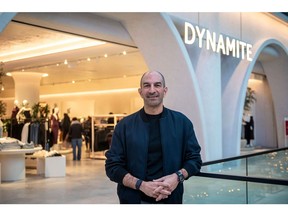Article content
(Bloomberg) — The retail entrepreneur behind fast-fashion chain Groupe Dynamite Inc. says he decided to take the company public after exploring talks with private equity groups and determining they weren’t the right fit.
Written by Bloomberg News on . Posted in Canada.
The retail entrepreneur behind fast-fashion chain Groupe Dynamite Inc. says he decided to take the company public after exploring talks with private equity groups and determining they weren’t the right fit.
Author of the article:
Bloomberg News
Mathieu Dion
Published Dec 09, 2024 • 3 minute read

(Bloomberg) — The retail entrepreneur behind fast-fashion chain Groupe Dynamite Inc. says he decided to take the company public after exploring talks with private equity groups and determining they weren’t the right fit.
Article content
Article content
The company that owns the Garage and Dynamite retail brands went public last month on the Toronto Stock Exchange, with owner and Chief Executive Officer Andrew Lutfy selling a 13% interest. It was the largest initial public offering of a Canadian company on the country’s main exchange this year, and valued Lutfy’s stake at nearly C$2 billion ($1.4 billion).
Advertisement 2
Story continues below
This advertisement has not loaded yet, but your article continues below.
THIS CONTENT IS RESERVED FOR SUBSCRIBERS ONLY
Subscribe now to read the latest news in your city and across Canada.
SUBSCRIBE TO UNLOCK MORE ARTICLES
Subscribe now to read the latest news in your city and across Canada.
REGISTER / SIGN IN TO UNLOCK MORE ARTICLES
Create an account or sign in to continue with your reading experience.
THIS ARTICLE IS FREE TO READ REGISTER TO UNLOCK.
Create an account or sign in to continue with your reading experience.
or
Article content
The 60-year-old businessman said the IPO resulted from a “come-to-Jesus moment” at the end of 2018, when he realized he had neither an internal successor nor children willing to take over.
He needed a plan — but he also needed to improve the business. When the pandemic hit, the company filed for creditor protection to restructure its store leases, saving costs and putting more emphasis on better locations. Revenue and profits surged.
“Private equity firms like buying broken assets, adding value, and then exiting three to five years later at a profit,” he said. “Although they marveled at our business, they had a hard time appreciating where they could fit in, and we agreed.” Going public became the best option.
Lutfy’s realization that he lacked successors led him to create a formal board of directors and an employee share ownership plan in 2019. He also hired McKinsey & Co. to “change the mindset from compliance and audit, to growth and goals.” Since 2021, revenues have grown at a compounded annual rate of nearly 15%, reaching C$888 million for the 12-month period that ended Aug. 3.
Top Stories
Get the latest headlines, breaking news and columns.
By signing up you consent to receive the above newsletter from Postmedia Network Inc.
Thanks for signing up!
A welcome email is on its way. If you don’t see it, please check your junk folder.
The next issue of Top Stories will soon be in your inbox.
We encountered an issue signing you up. Please try again
Article content
Advertisement 3
Story continues below
This advertisement has not loaded yet, but your article continues below.
Article content
Today, Groupe Dynamite has about 300 stores in Canada and the US and plans to add 50 more by the end of fiscal 2028, including in the UK.
Luxury Property
Lutfy started in the business in 1982 as a stockroom clerk at the first Garage store in Montreal, which was owned by his then-girlfriend’s family. The family gave him a sweat-equity stake of 25% in the 1980s, and in 2003 he bought all remaining shares of the company.
The shares offered during the IPO were a “minimum viable float,” Lutfy said, but he’s thinking about gradually selling down his stake to 10% by 2035.
Groupe Dynamite shares went public at C$21, and the stock is now slightly below that level. Lutfy said he’s not concerned: his company offers a “nice complement” to a balanced Canadian portfolio. The TSX is heavy on mining and financial services stocks, with few large retailers. “There is a scarcity of our type of business,” he said.
After the underwriters’ fee, the IPO yielded C$281 million in cash for Lutfy, out of which he repaid Dynamite C$110 million. He doesn’t yet know what he’ll do with the rest.
He already owns a sizable real estate portfolio in the Canadian province of Quebec. Managing this portfolio occupies about half of his time.
Advertisement 4
Story continues below
This advertisement has not loaded yet, but your article continues below.
Article content
He owns 80% of the Royalmount, a new luxury shopping mall in Montreal, the first phase of which cost more than C$1 billion. The project is also backed by L Catterton, a private equity firm tied to LVHM Moet Hennessy Louis Vuitton and French luxury magnate Bernard Arnault, the world’s fifth-richest person.
The first phase represents only 8% of the total Royalmount complex Lutfy hopes to build — those plans include thousands of housing units — and he can’t hide his ambitions or his involvement. While walking through the mall, he stopped to take a picture of a defective floor joint and report it.
Lutfy also holds a 20% stake in another Quebec shopping center and owns the Four Seasons Hotel in Montreal. His family office also invests in public markets and private companies.
Lutfy said he’s in the business of making people happy, and it pays off. “I have a reasonable third leg to my life that has a fair amount of liquidity.”
To investors who might be concerned about his full commitment to Dynamite, he said: “The past is an amazing precursor to the future in this case.”
Article content
Share this article in your social network
Featured Local Savings
Comments